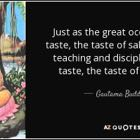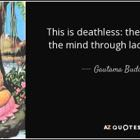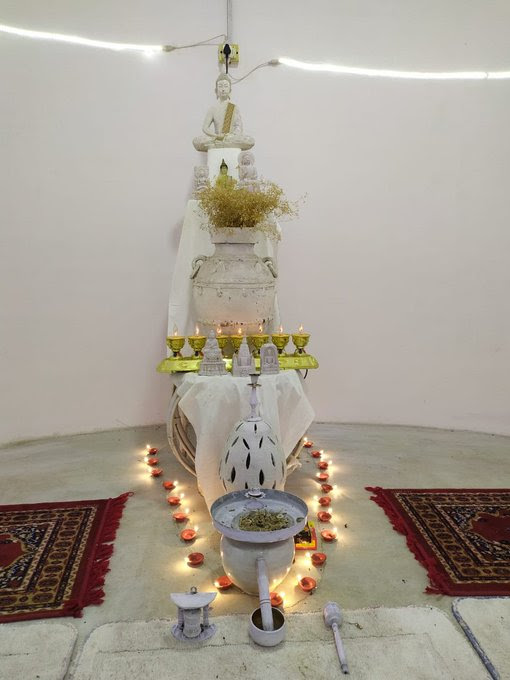For The Welfare, Happiness, Peace of All Sentient and Non-Sentient Beings and for them to Attain Eternal Peace as Final Goal.
KUSHINARA NIBBANA BHUMI PAGODA-is a 18 feet Dia All White Pagoda with a table or, but be sure to having above head level based on the usual use of the room.
At
WHITE HOME
668, 5A main Road, 8th Cross, HAL III Stage, Prabuddha Bharat Puniya Bhumi Bengaluru
Magadhi Karnataka State PRABUDDHA BHARAT >> Sutta Piṭaka >> Buddha’s own words on 115) Classical Yoruba-Yoruba Yoruba, 116) Classical Zulu-I-Classical Zulu
in 116 CLASSICAL LANGUAGES and planning to project Therevada Tipitaka
in Buddha’s own words and Important Places like Lumbini, Bodh gaya,
Saranath, Kushinara, Etc., in 3D 360 degree circle vision akin to
Circarama
Saṃyutta Nikāya >> Saḷāyatana Saṃyutta
SN 35.20 (S iv 13)
Abhinanda Sutta
— Delight — in 29) Classical English,Roman,
79) Classical Persian-کلاسیک فارسی
80) Classical Polish-Język klasyczny polski,81) Classical Portuguese-Português Clássico,82) Classical Punjabi-ਕਲਾਸੀਕਲ ਪੰਜਾਬੀ,83) Classical Romanian-Clasic românesc,84) Classical Russian-Классический русский,85) Classical Samoan-Samoan Samoa,
86) Classical Sanskrit छ्लस्सिचल् षन्स्क्रित्
87) Classical Scots Gaelic-Gàidhlig Albannach Clasaigeach,
89) Classical Sesotho-Seserbia ea boholo-holo,
90) Classical Shona-Shona Shona,
91) Classical Sindhi,
92) Classical Sinhala-සම්භාව්ය සිංහල,
93) Classical Slovak-Klasický slovenský
94) Classical Slovenian-Klasična slovenska,
95) Classical Somali-Soomaali qowmiyadeed,
96) Classical Spanish-Español clásico,
97) Classical Sundanese-Sunda Klasik,
98) Classical Swahili,Kiswahili cha Classical,
99) Classical Swedish-Klassisk svensk,
100) Classical Tajik-тоҷикӣ классикӣ,
101) Classical Tamil-பாரம்பரிய இசைத்தமிழ் செம்மொழி,
104) Classical Thai-ภาษาไทยคลาสสิก,
105) Classical Turkish-Klasik Türk,
108) Classical Urdu- کلاسیکی اردو
111) Classical Vietnamese-Tiếng Việ
113) Classical Xhosa-IsiXhosa zesiXhosa,
114) Classical Yiddish- קלאסישע ייִדיש
![]()
[abhinanda]
Buddha’s own words on
There is no escape for whoever delights in sense objects.
One,
bhikkhus, who delights in (visible) forms, delights in
unsatisfactoriness. Of one who delights in unsatisfactoriness, I say:
‘he is not liberated from unsatisfactoriness’.
One, bhikkhus, who
delights in sounds, delights in unsatisfactoriness. Of one who delights
in unsatisfactoriness, I say: ‘he is not liberated from
unsatisfactoriness’.
One, bhikkhus, who delights in odors,
delights in unsatisfactoriness. Of one who delights in
unsatisfactoriness, I say: ‘he is not liberated from
unsatisfactoriness’.
One, bhikkhus, who delights in tastes,
delights in unsatisfactoriness. Of one who delights in
unsatisfactoriness, I say: ‘he is not liberated from
unsatisfactoriness’.
One, bhikkhus, who delights in bodily
phenomena, delights in unsatisfactoriness. Of one who delights in
unsatisfactoriness, I say: ‘he is not liberated from
unsatisfactoriness’.
One, bhikkhus, who delights in mental
phenomena, delights in unsatisfactoriness. Of one who delights in
unsatisfactoriness, I say: ‘he is not liberated from
unsatisfactoriness’.
One, bhikkhus, who does not delight in
(visible) forms, does not delight in unsatisfactoriness. Of one who does
not delight in unsatisfactoriness, I say: ‘he is liberated from
unsatisfactoriness’.
One, bhikkhus, who does not delight in
sounds, does not delight in unsatisfactoriness. Of one who does not
delight in unsatisfactoriness, I say: ‘he is liberated from
unsatisfactoriness’.
One, bhikkhus, who does not delight in
odors, does not delight in unsatisfactoriness. Of one who does not
delight in unsatisfactoriness, I say: ‘he is liberated from
unsatisfactoriness’.
One, bhikkhus, who does not delight in
tastes, does not delight in unsatisfactoriness. Of one who does not
delight in unsatisfactoriness, I say: ‘he is liberated from
unsatisfactoriness’.
One, bhikkhus, who does not delight in
bodily phenomena, does not delight in unsatisfactoriness. Of one who
does not delight in unsatisfactoriness, I say: ‘he is liberated from
unsatisfactoriness’.
One, bhikkhus, who does not delight in mental phenomena, does not delight in unsatisfactoriness.
Of one who does not delight in unsatisfactoriness, I say: ‘he is liberated from unsatisfactoriness’.

>> سوټا پییاکا >>
Saṃyutt Nikāya >> Saḷāyatana Saṃyutta
SN 35.20 (S iv 13)
ابهینند سټاټا
د بودا خپل ټکي په
- خوند - د ننګونو ، سندرې ، میوزیک ، مزاح او ویډیوګانو سره
[ابهیندا]
د بودا خپل ټکي په
هیڅ څوک د خلاصون لپاره نشته څوک چې په احساساتو شیانو خوښ شي.
یو
، بخخس ، څوک چې (څرګندیدونکي) ب inو کې خوښوي ، د نا رضایتۍ څخه خوښ دي. د
هغه چا څخه چې په نا رضایتي خوښ وي ، زه وایم: “هغه د اطمینان نه خلاص شوی
نه دی”.
یو ، بخخس ، څوک چې په غږونو کې خوشحاله کوي ، د نا رضایتۍ
څخه خوښوي. د هغه چا څخه چې په نا رضایتي خوښ وي ، زه وایم: “هغه د
اطمینان نه خلاص شوی نه دی”.
یو ، بخخس ، څوک چې په بویونو کې خوند
اخلي ، د نا رضایتۍ څخه خوښ دي. د هغه چا څخه چې په نا رضایتۍ خوښ وي ، زه
وایم: “هغه د نا رضایتۍ څخه آزاد شوی ندی”.
یو ، بخخس ، څوک چې په
خوندونو کې خوند کوي ، په نا رضایتي کې خوښ دي. د هغه چا څخه چې په نا
رضایتي خوښ وي ، زه وایم: “هغه د اطمینان نه خلاص شوی نه دی”.
یو ،
بکخس ، څوک چې په جسمي پیښو کې خوښ دی ، د نا رضایتۍ څخه خوښ دی. د هغه چا
څخه چې په نا رضایتۍ خوښ وي ، زه وایم: “هغه د نا رضایتۍ څخه آزاد شوی
ندی”.
یو ، بخخس ، څوک چې په فکري پیښې خوښوي ، د نا رضایتۍ څخه خوښ
دي. د هغه چا څخه چې په نا رضایتي خوښ وي ، زه وایم: “هغه د اطمینان نه
خلاص شوی نه دی”.
یو ، بخخس ، څوک چې (څرګندیدونکي) ب inو کې خوښ نه
وي ، د نا رضایتۍ څخه خوند نه اخلي. د هغه چا څخه چې د رضایت څخه خوښ نه
وي ، زه وایم: “هغه د نا رضایتۍ څخه خلاص شوی دی”.
یو ، بخخوس ، څوک
چې په غږونو کې خوشحالي نه کوي ، د نا رضایتۍ څخه خوښ نه کوي. د هغه چا
څخه چې د رضایت څخه خوښ نه وي ، زه وایم: “هغه د نا رضایتۍ څخه خلاص شوی
دی”.
یو ، بخخس ، څوک چې په بویونو کې خوند نه کوي ، په نا رضایتي
خوښ نه کوي. د هغه چا څخه چې په نا رضایتي خوښ نه وي ، زه وایم: ‘هغه د نا
رضایتۍ څخه خلاص شوی دی’.
یو ، بخخس ، څوک چې په خوندونو کې خوند نه
کوي ، د نا رضایتۍ څخه خوښ نه کوي. د هغه چا څخه چې په نا رضایتي خوښ نه
وي ، زه وایم: ‘هغه د نا رضایتۍ څخه خلاص شوی دی’.
یو ، بخخس ، څوک
چې په جسمي پیښو کې خوښ نه وي ، د نا رضایتۍ څخه خوښ ندي. د هغه چا څخه چې
په نا رضایتي خوښ نه وي ، زه وایم: ‘هغه د نا رضایتۍ څخه خلاص شوی دی’.
یو ، بخخس ، څوک چې په فکري پیښې خوښ نه کوي ، د نا رضایتۍ څخه خوښ ندي.
د هغه چا څخه چې په نا رضایتي خوښ نه وي ، زه وایم: ‘هغه د نا رضایتۍ څخه خلاص شوی دی’.
سوتاها کلمه به کلمه
>> سوتا پیناکا >>
Saṃyutta Nikāya >> Saḷāyatana Saṃyutta
SN 35.20 (S iv 13)
ابیناندا سوتا
سخنان خود بودا در مورد
- لذت - با شعار ، آهنگ ، موسیقی ، کمدی و فیلم
[abhinanda]
سخنان خود بودا در مورد
برای هر کس که از اشیا objects حس لذت می برد ، گریزی نیست.
یکی
، bhikkhus ، که از اشکال (قابل مشاهده) لذت می برد ، از عدم رضایتمندی
لذت می برد. درباره کسی که از عدم رضایتمندی لذت می برد ، می گویم: “او از
عدم رضایت رهایی نمی یابد”.
یکی ، bhikkhus ، که از صداها لذت می
برد ، از عدم رضایتمندی لذت می برد. درباره کسی که از عدم رضایت خاطر لذت
می برد ، می گویم: “او از عدم رضایت رهایی نمی یابد”.
یکی ،
bhikkhus ، که از بو خوشحال می شود ، از عدم رضایتمندی لذت می برد. درباره
کسی که از عدم رضایت خاطر لذت می برد ، می گویم: “او از عدم رضایت رهایی
نمی یابد”.
یکی ، bhikkhus ، که از ذائقه لذت می برد ، از عدم
رضایتمندی لذت می برد. درباره کسی که از عدم رضایتمندی لذت می برد ، می
گویم: “او از عدم رضایت رهایی نمی یابد”.
یکی ، بیخخوس ، که از
پدیده های بدنی لذت می برد ، از عدم رضایت خاطر لذت می برد. درباره کسی که
از عدم رضایتمندی لذت می برد ، می گویم: “او از عدم رضایت رهایی نمی یابد”.
یکی
، bhikkhus ، که از پدیده های ذهنی لذت می برد ، از عدم رضایتمندی لذت می
برد. درباره کسی که از عدم رضایت خاطر لذت می برد ، می گویم: “او از عدم
رضایت رهایی نمی یابد”.
یکی ، bhikkhus ، که از اشکال (قابل مشاهده)
لذت نمی برد ، از عدم رضایت خاطر لذت نمی برد. از کسی که از عدم رضایت
خاطر لذت نمی برد ، می گویم: “او از عدم رضایتمندی آزاد می شود”.
یکی
، bhikkhus ، که از صداها لذت نمی برد ، از عدم رضایت خاطر لذت نمی برد.
از کسی که از عدم رضایت خاطر لذت نمی برد ، می گویم: “او از عدم رضایتمندی
آزاد می شود”.
یکی ، bhikkhus ، که از بو خوشحال نمی شود ، از عدم
رضایت خاطر لذت نمی برد. از کسی که از عدم رضایت خاطر لذت نمی برد ، می
گویم: “او از عدم رضایتمندی آزاد می شود”.
یکی ، bhikkhus ، که از
ذائقه لذت نمی برد ، از عدم رضایت خاطر لذت نمی برد. از کسی که از عدم
رضایت خاطر لذت نمی برد ، می گویم: “او از عدم رضایتمندی آزاد می شود”.
یکی
، bhikkhus ، که از پدیده های بدنی لذت نمی برد ، از عدم رضایت خاطر لذت
نمی برد. از کسی که از عدم رضایت خاطر لذت نمی برد ، می گویم: “او از عدم
رضایتمندی آزاد می شود”.
یکی ، bhikkhus ، که از پدیده های ذهنی لذت نمی برد ، از عدم رضایت خاطر لذت نمی برد.
از کسی که از عدم رضایت خاطر لذت نمی برد ، می گویم: “او از عدم رضایتمندی آزاد می شود”.

>> Sutta Piṭaka >>
Sayutta Nikāya >> Saāyatana Sayutta
SN 35,20 (S iv 13)
Abhinanda Sutta
Własne słowa Buddy dalej
- Zachwyt - z pieśniami, piosenkami, muzyką, komediami i filmami
[abhinanda]
Własne słowa Buddy dalej
Nie ma ucieczki dla tego, kto lubi obiekty zmysłowe.
Jeden,
mnisi, który zachwyca się (widzialnymi) formami, rozkoszuje się
niezadowoleniem. O tym, który lubi niezadowolenie, mówię: „nie jest
wyzwolony od niezadowolenia”.
Jeden, mnisi, który zachwyca się
dźwiękami, zachwyca się niezadowoleniem. O tym, który lubi
niezadowolenie, mówię: „nie jest wyzwolony od niezadowolenia”.
Jeden,
mnisi, który zachwyca się zapachami, zachwyca się niezadowoleniem. O
tym, który lubi niezadowolenie, mówię: „nie jest wyzwolony od
niezadowolenia”.
Jeden, mnisi, który zachwyca się smakami,
zachwyca się niedosytem. O kimś, kto lubi niezadowolenie, mówię: „nie
jest wyzwolony od niezadowolenia”.
Jeden, mnisi, który rozkoszuje
się zjawiskami cielesnymi, rozkoszuje się niezadowoleniem. O tym, który
lubi niezadowolenie, mówię: „nie jest wyzwolony od niezadowolenia”.
Jeden,
mnisi, który rozkoszuje się zjawiskami psychicznymi, rozkoszuje się
niezadowoleniem. O tym, który lubi niezadowolenie, mówię: „nie jest
wyzwolony od niezadowolenia”.
Jeden, mnisi, który nie zachwyca
się (widzialnymi) formami, nie cieszy się niezadowoleniem. O kimś, kto
nie zachwyca się niedosytem, mówię: „wyzwolił się z niezadowolenia”.
Jeden,
mnisi, który nie zachwyca się dźwiękami, nie zachwyca się
niezadowoleniem. O kimś, kto nie cieszy się niezadowoleniem, mówię:
„wyzwolił się z niezadowolenia”.
Jeden, mnisi, który nie zachwyca
się zapachami, nie zachwyca się niedosytem. O kimś, kto nie zachwyca
się niedosytem, mówię: „wyzwolił się z niezadowolenia”.
Jeden,
mnisi, który nie zachwyca się smakami, nie zachwyca się niedosytem. O
kimś, kto nie zachwyca się niedosytem, mówię: „wyzwolił się z
niezadowolenia”.
Jeden, mnisi, który nie zachwyca się zjawiskami
cielesnymi, nie cieszy się niezadowoleniem. O kimś, kto nie cieszy się
niezadowoleniem, mówię: „wyzwolił się z niezadowolenia”.
Jeden, mnisi, który nie zachwyca się zjawiskami psychicznymi, nie cieszy się niezadowoleniem.
O kimś, kto nie cieszy się niezadowoleniem, mówię: „wyzwolił się z niezadowolenia”.

>> Sutta Piṭaka >>
Saṃyutta Nikāya >> Saḷāyatana Saṃyutta
SN 35,20 (S iv 13)
Abhinanda Sutta
As próprias palavras de Buda sobre
- Deleite - com cânticos, canções, música, comédia e vídeos
[abhinanda]
As próprias palavras de Buda sobre
Não há escapatória para quem se deleita com os objetos dos sentidos.
Um,
bhikkhus, que se deleita com as formas (visíveis), se deleita com a
insatisfação. De quem se deleita com a insatisfatoriedade, eu digo: ‘ele
não está livre da insatisfatoriedade’.
Um, bhikkhus, que se
deleita com os sons, se deleita com a insatisfação. De quem se delicia
com a insatisfatoriedade, eu digo: ‘ele não está livre da
insatisfatoriedade’.
Um, bhikkhus, que se deleita com os odores,
se deleita com a insatisfação. De quem se deleita com a
insatisfatoriedade, eu digo: ‘ele não se livra da insatisfatoriedade’.
Um,
bhikkhus, que se deleita com os sabores, se deleita com a insatisfação.
De quem se deleita com a insatisfatoriedade, eu digo: ‘ele não está
livre da insatisfatoriedade’.
Um, bhikkhus, que se deleita com os
fenômenos corporais, se deleita com a insatisfação. De quem se deleita
com a insatisfatoriedade, eu digo: ‘ele não está livre da
insatisfatoriedade’.
Um, bhikkhus, que se deleita com os
fenômenos mentais, se deleita com a insatisfação. De quem se deleita com
a insatisfatoriedade, eu digo: ‘ele não está livre da
insatisfatoriedade’.
Um, bhikkhus, que não se deleita com as
formas (visíveis), não se deleita com a insatisfação. De quem não se
deleita com a insatisfação, eu digo: ‘ele está livre da insatisfação’.
Um,
bhikkhus, que não se deleita com sons, não se deleita com a
insatisfação. De quem não se deleita com a insatisfação, eu digo: ‘ele
está livre da insatisfação’.
Um, bhikkhus, que não se deleita com
odores, não se deleita com a insatisfação. De quem não se deleita com a
insatisfação, eu digo: ‘ele está livre da insatisfação’.
Um,
bhikkhus, que não se deleita com gostos, não se deleita com a
insatisfação. De quem não se deleita com a insatisfação, eu digo: ‘ele
está livre da insatisfação’.
Um, bhikkhus, que não se deleita com
os fenômenos corporais, não se deleita com a insatisfação. De quem não
se deleita com a insatisfação, eu digo: ‘ele está livre da
insatisfação’.
Um, bhikkhus, que não se deleita com fenômenos mentais, não se deleita com a insatisfação.
De quem não se deleita com a insatisfação, eu digo: ‘ele está livre da insatisfação’.

ਭਿੱਖੂਸ, ਜੋ (ਵੇਖਣਯੋਗ) ਰੂਪਾਂ ਵਿਚ ਅਨੰਦ ਲੈਂਦਾ ਹੈ, ਅਸੰਤੁਸ਼ਟੀ ਵਿਚ ਅਨੰਦ ਲੈਂਦਾ
ਹੈ. ਇਕ ਜੋ ਅਸੰਤੁਸ਼ਟੀ ਵਿਚ ਖੁਸ਼ ਹੁੰਦਾ ਹੈ, ਮੈਂ ਕਹਿੰਦਾ ਹਾਂ: ‘ਉਹ ਅਸੰਤੁਸ਼ਟੀ ਤੋਂ
ਮੁਕਤ ਨਹੀਂ ਹੈ’.
ਭਿੱਖੁਸ, ਜੋ ਆਵਾਜ਼ਾਂ ਵਿਚ ਪ੍ਰਸੰਨ ਹੁੰਦਾ ਹੈ, ਅਸੰਤੁਸ਼ਟੀ ਵਿਚ ਖ਼ੁਸ਼ ਹੁੰਦਾ ਹੈ.
ਇਕ ਜੋ ਅਸੰਤੁਸ਼ਟੀ ਵਿਚ ਖੁਸ਼ ਹੁੰਦਾ ਹੈ, ਮੈਂ ਕਹਿੰਦਾ ਹਾਂ: ‘ਉਹ ਅਸੰਤੁਸ਼ਟੀ ਤੋਂ
ਮੁਕਤ ਨਹੀਂ ਹੈ’.
ਭਿੱਖੁਸ, ਜੋ ਮਹਿਕਾਂ ਵਿਚ ਅਨੰਦ ਲੈਂਦਾ ਹੈ, ਅਸੰਤੁਸ਼ਟੀ ਵਿਚ ਖ਼ੁਸ਼ ਹੁੰਦਾ ਹੈ. ਇਕ
ਜੋ ਅਸੰਤੁਸ਼ਟੀ ਵਿਚ ਖੁਸ਼ ਹੁੰਦਾ ਹੈ, ਮੈਂ ਕਹਿੰਦਾ ਹਾਂ: ‘ਉਹ ਅਸੰਤੁਸ਼ਟੀ ਤੋਂ ਮੁਕਤ
ਨਹੀਂ ਹੈ’.
ਭਿੱਖੁਸ, ਜੋ ਸਵਾਦ ਵਿਚ ਅਨੰਦ ਲੈਂਦਾ ਹੈ, ਅਸੰਤੁਸ਼ਟੀ ਵਿਚ ਖੁਸ਼ ਹੁੰਦਾ ਹੈ. ਇਕ ਜੋ
ਅਸੰਤੁਸ਼ਟੀ ਵਿਚ ਖੁਸ਼ ਹੁੰਦਾ ਹੈ, ਮੈਂ ਕਹਿੰਦਾ ਹਾਂ: ‘ਉਹ ਅਸੰਤੁਸ਼ਟੀ ਤੋਂ ਮੁਕਤ ਨਹੀਂ
ਹੈ’.
ਭਿੱਖੁਸ, ਜੋ ਸਰੀਰਕ ਵਰਤਾਰੇ ਵਿਚ ਅਨੰਦ ਲੈਂਦਾ ਹੈ, ਅਸੰਤੁਸ਼ਟੀ ਵਿਚ ਖ਼ੁਸ਼ ਹੁੰਦਾ
ਹੈ. ਇਕ ਜੋ ਅਸੰਤੁਸ਼ਟੀ ਵਿਚ ਖੁਸ਼ ਹੁੰਦਾ ਹੈ, ਮੈਂ ਕਹਿੰਦਾ ਹਾਂ: ‘ਉਹ ਅਸੰਤੁਸ਼ਟੀ ਤੋਂ
ਮੁਕਤ ਨਹੀਂ ਹੈ’.
ਭੀਖੁਸ, ਜਿਹੜਾ ਮਾਨਸਿਕ ਵਰਤਾਰੇ ਵਿਚ ਅਨੰਦ ਲੈਂਦਾ ਹੈ, ਅਸੰਤੁਸ਼ਟੀ ਵਿਚ ਖੁਸ਼ ਹੁੰਦਾ
ਹੈ. ਇਕ ਜੋ ਅਸੰਤੁਸ਼ਟੀ ਵਿਚ ਖੁਸ਼ ਹੁੰਦਾ ਹੈ, ਮੈਂ ਕਹਿੰਦਾ ਹਾਂ: ‘ਉਹ ਅਸੰਤੁਸ਼ਟੀ ਤੋਂ
ਮੁਕਤ ਨਹੀਂ ਹੈ’.
ਭਿੱਖੁਸ, ਜੋ (ਦਿੱਸਣ ਵਾਲੇ) ਰੂਪਾਂ ਵਿਚ ਪ੍ਰਸੰਨ ਨਹੀਂ ਹੁੰਦਾ, ਅਸੰਤੁਸ਼ਟੀ ਵਿਚ ਖੁਸ਼
ਨਹੀਂ ਹੁੰਦਾ. ਇਕ ਜੋ ਅਸੰਤੁਸ਼ਟੀ ਵਿਚ ਖੁਸ਼ ਨਹੀਂ ਹੁੰਦਾ, ਮੈਂ ਕਹਿੰਦਾ ਹਾਂ: ‘ਉਹ
ਅਸੰਤੁਸ਼ਟੀ ਤੋਂ ਮੁਕਤ ਹੈ’.
ਭੀਖੁਸ, ਜੋ ਆਵਾਜ਼ਾਂ ਵਿਚ ਪ੍ਰਸੰਨ ਨਹੀਂ ਹੁੰਦਾ, ਅਸੰਤੁਸ਼ਟੀ ਵਿਚ ਪ੍ਰਸੰਨ ਨਹੀਂ
ਹੁੰਦਾ. ਉਸ ਵਿਚੋਂ ਇਕ ਜੋ ਅਸੰਤੁਸ਼ਟੀ ਵਿਚ ਖੁਸ਼ ਨਹੀਂ ਹੁੰਦਾ, ਮੈਂ ਕਹਿੰਦਾ ਹਾਂ: ‘ਉਹ
ਅਸੰਤੁਸ਼ਟੀ ਤੋਂ ਮੁਕਤ ਹੈ’.
ਭਿੱਖੁਸ, ਜੋ ਮਹਿਕ ਤੋਂ ਖੁਸ਼ ਨਹੀਂ ਹੁੰਦਾ, ਅਸੰਤੁਸ਼ਟੀ ਵਿਚ ਖ਼ੁਸ਼ ਨਹੀਂ ਹੁੰਦਾ. ਇਕ
ਜੋ ਅਸੰਤੁਸ਼ਟੀ ਵਿਚ ਖੁਸ਼ ਨਹੀਂ ਹੁੰਦਾ, ਮੈਂ ਕਹਿੰਦਾ ਹਾਂ: ‘ਉਹ ਅਸੰਤੁਸ਼ਟੀ ਤੋਂ
ਮੁਕਤ ਹੈ’.
ਭਿੱਖੁਸ, ਜਿਹੜਾ ਸਵਾਦ ਨੂੰ ਪਸੰਦ ਨਹੀਂ ਕਰਦਾ, ਅਸੰਤੁਸ਼ਟੀ ਵਿਚ ਪ੍ਰਸੰਨ ਨਹੀਂ ਹੁੰਦਾ.
ਇਕ ਜੋ ਅਸੰਤੁਸ਼ਟੀ ਵਿਚ ਖੁਸ਼ ਨਹੀਂ ਹੁੰਦਾ, ਮੈਂ ਕਹਿੰਦਾ ਹਾਂ: ‘ਉਹ ਅਸੰਤੁਸ਼ਟੀ ਤੋਂ
ਮੁਕਤ ਹੈ’.
ਭਿੱਖੂਸ, ਜਿਹੜਾ ਸਰੀਰਕ ਵਰਤਾਰਿਆਂ ਵਿਚ ਪ੍ਰਸੰਨ ਨਹੀਂ ਹੁੰਦਾ, ਅਸੰਤੁਸ਼ਟੀ ਵਿਚ
ਪ੍ਰਸੰਨ ਨਹੀਂ ਹੁੰਦਾ. ਇਕ ਜੋ ਅਸੰਤੁਸ਼ਟੀ ਵਿਚ ਖੁਸ਼ ਨਹੀਂ ਹੁੰਦਾ, ਮੈਂ ਕਹਿੰਦਾ ਹਾਂ:
‘ਉਹ ਅਸੰਤੁਸ਼ਟੀ ਤੋਂ ਮੁਕਤ ਹੈ’.

>> Sutta Piṭaka >>
Saṃyutta Nikāya >> Saḷāyatana Saṃyutta
SN 35.20 (S iv 13)
Abhinanda Sutta
Cuvintele lui Buddha pe
- Delect - cu cântece, cântece, muzică, comedie și videoclipuri
[abhinanda]
Cuvintele lui Buddha pe
Nu există nicio scăpare pentru cine se delectează cu obiectele de simț.
Unul,
bhikkhus, care se bucură de forme (vizibile), se bucură de
nesatisfacție. Unul care se bucură de nesatisfacție, spun: „nu este
eliberat de nesatisfacție”.
Unul, bhikkhus, care se bucură de
sunete, se bucură de nesatisfacție. Unul care se bucură de
nesatisfacție, spun: „nu este eliberat de nesatisfacție”.
Unul,
bhikkhus, care se bucură de mirosuri, se bucură de nesatisfacție. Din
cel care se bucură de nesatisfacție, spun: „nu este eliberat de
nesatisfacție”.
Unul, bhikkhus, care se bucură de gusturi, se
bucură de nesatisfacție. Unul care se bucură de nesatisfacție, spun: „nu
este eliberat de nesatisfacție”.
Unul, bhikkhus, care se bucură
de fenomenele corporale, se bucură de nesatisfacție. Unul care se bucură
de nesatisfacție, spun: „nu este eliberat de nesatisfacție”.
Unul,
bhikkhus, care se bucură de fenomenele mentale, se bucură de
nesatisfacție. Unul care se bucură de nesatisfacție, spun: „nu este
eliberat de nesatisfacție”.
Unul, bhikkhus, care nu se bucură de
formele (vizibile), nu se bucură de nesatisfacție. Din cel care nu se
încântă în nesatisfacție, spun: „este eliberat de nesatisfacție”.
Unul,
bhikkhus, care nu se bucură de sunete, nu se bucură de nesatisfacție.
Din cel care nu se bucură de nesatisfacție, spun: „este eliberat de
nesatisfacție”.
Unul, bhikkhus, care nu se bucură de mirosuri, nu
se bucură de nesatisfacție. Din cel care nu se bucură de nesatisfacție,
spun: „este eliberat de nesatisfacție”.
Unul, bhikkhus, care nu
se bucură de gusturi, nu se bucură de nesatisfacție. Din cel care nu se
încântă în nesatisfacție, spun: „este eliberat de nesatisfacție”.
Unul,
bhikkhus, care nu se bucură de fenomenele corporale, nu se bucură de
nesatisfacție. Din cel care nu se bucură de nesatisfacție, spun: „este
eliberat de nesatisfacție”.
Unul, bhikkhus, care nu se bucură de fenomenele mentale, nu se bucură de nesatisfacție.
Din cel care nu se bucură de nesatisfacție, spun: „este eliberat de nesatisfacție”.

>> Сутта Пинака >>
Саньютта Никая >> Санаятана Саньютта
SN 35.20 (S iv 13)
Абхинанда Сутта
Собственные слова Будды о
- Восторг - с песнопениями, песнями, музыкой, комедиями и видео
[абхинанда]
Собственные слова Будды о
Нет выхода тому, кто наслаждается объектами чувств.
Один,
монахи, который наслаждается (видимыми) формами, наслаждается
неудовлетворительностью. О том, кто наслаждается
неудовлетворительностью, я говорю: «он не освобожден от
неудовлетворенности».
Один, монахи, наслаждается звуками,
наслаждает неудовлетворительность. О том, кто наслаждается
неудовлетворительностью, я говорю: «он не освобожден от
неудовлетворенности».
Один, бхикшу, который любит запахи,
наслаждается неудовлетворительностью. О том, кто наслаждается
неудовлетворительностью, я говорю: «он не освобожден от
неудовлетворенности».
Тот, монахи, который любит вкус,
наслаждается неудовлетворительностью. О том, кто наслаждается
неудовлетворительностью, я говорю: «он не освобожден от
неудовлетворенности».
Один, бхикшу, который наслаждается
телесными явлениями, наслаждается неудовлетворительностью. О том, кто
наслаждается неудовлетворительностью, я говорю: «он не освобожден от
неудовлетворенности».
Один, бхиккху, который наслаждается
ментальными явлениями, наслаждается неудовлетворительностью. О том, кто
наслаждается неудовлетворительностью, я говорю: «он не освобожден от
неудовлетворенности».
Тот, бхиккху, который не любит (видимые)
формы, не любит неудовлетворенности. О том, кто не любит
неудовлетворенность, я говорю: «он освобожден от неудовлетворенности».
Одного,
монахов, которому не нравятся звуки, не радует неудовлетворительность. О
том, кто не любит неудовлетворенность, я говорю: «он освобожден от
неудовлетворенности».
Тот, бхикшу, который не любит запахи, не
любит неудовлетворенности. О том, кто не любит неудовлетворенность, я
говорю: «он освобожден от неудовлетворенности».
Тот, бхикшу,
который не любит вкусы, не любит неудовлетворенности. О том, кто не
любит неудовлетворенность, я говорю: «он освобожден от
неудовлетворенности».
Тот, бхиккху, который не наслаждается
телесными явлениями, не любит неудовлетворенности. О том, кто не любит
неудовлетворенность, я говорю: «он освобожден от неудовлетворенности».
Один, монахи, не находящий удовольствия в ментальных явлениях, не испытывает удовольствия от неудовлетворенности.
О том, кто не любит неудовлетворенность, я говорю: «он освобожден от неудовлетворенности».

>> Sutta Piṭaka >>
Saṃyutta Nikāya >> Saḷāyatana Saṃyutta
SN 35.20 (S iv 13)
Abhinanda Sutta
O upu a Buddha lava ia
- Fiafia - ma pese, pese, musika, malie ma vitio
[abhinanda]
O upu a Buddha lava ia
E leai se sola ese mo soʻo se tasi e fiafia i ni mea faitino.
Tasi,
bhikkhus, o le e fiafia i (vaaia) fomu, fiafia i le le faamalieina. I
se tasi e fiafia i le le faʻamalieina, ou te fai atu: ‘e le
faʻasaʻolotoina o ia mai le le faʻamalieina’.
Tasi, bhikkhus, o
le fiafia i leo, fiafia i le le faamalieina. I se tasi e fiafia i le le
faʻamalieina, ou te fai atu: ‘e le faʻasaʻolotoina o ia mai le le
faʻamalieina’.
Tasi, bhikkhus, o le fiafia i manogi, fiafia i le
le faamalieina. I se tasi e fiafia i le le faʻamalieina, ou te fai atu:
‘e le faʻasaʻolotoina o ia mai le le faʻamalieina’.
Tasi,
bhikkhus, o le e fiafia i tofo, fiafia i le le faamalieina. I se tasi e
fiafia i le le faʻamalieina, ou te fai atu: ‘e le faʻasaʻolotoina o ia
mai le le faʻamalieina’.
Tasi, bhikkhus, o le fiafia i foliga
tino, fiafia i le le faamalieina. I se tasi e fiafia i le le
faʻamalieina, ou te fai atu: ‘e le faʻasaʻolotoina o ia mai le
faʻamalieina’.
Tasi, bhikkhus, o le e fiafia i mafaufauga
faalemafaufau, fiafia i le le faamalieina. I se tasi e fiafia i le le
faʻamalieina, ou te fai atu: ‘e le faʻasaʻolotoina o ia mai le
faʻamalieina’.
Tasi, bhikkhus, o le e le fiafia i (vaʻaia) fomu, e
le fiafia i le le faʻamalieina. I se tasi e le fiafia i le le
faʻamalieina, ou te fai atu: ‘ua faasaʻolotoina o ia mai le
faʻamalieina’.
Tasi, bhikkhus, e le fiafia i leo, e le fiafia i
le le faʻamalieina. I se tasi e le fiafia i le le faʻamalieina, ou te
fai atu: ‘ua faasaʻolotoina o ia mai le faʻamalieina’.
Tasi,
bhikkhus, o ia e le fiafia i manogi, e le fiafia i le le faʻamalieina. I
se tasi e le fiafia i le le faʻamalieina, ou te fai atu: ‘ua
faasaʻolotoina o ia mai le faʻamalieina’.
Tasi, bhikkhus, o le e
le fiafia i tofo, e le fiafia i le le faʻamalieina. I se tasi e le
fiafia i le le faʻamalieina, ou te fai atu: ‘ua faasaʻolotoina o ia mai
le faʻamalieina’.
Tasi, bhikkhus, o le e le fiafia i foliga tino,
e le fiafia i le le faʻamalieina. I se tasi e le fiafia i le le
faʻamalieina, ou te fai atu: ‘ua faasaʻolotoina o ia mai le
faʻamalieina’.
Tasi, bhikkhus, o le e le fiafia i mafaufauga faalemafaufau, e le fiafia i le le faʻamalieina.
I se tasi e le fiafia i le le faʻamalieina, ou te fai atu: ‘ua faasaʻolotoina o ia mai le faʻamalieina’.
86) Classical Sanskrit छ्लस्सिचल् षन्स्क्रित्,

>> षुत्त Pइṭअक >>
षṃयुत्त णिक्āय >> षḷāयतन षṃयुत्त
ष्ण् 35.20 (ष् इव् 13)
आभिनन्द षुत्त
Bउद्ध’स् ओwन् wओर्द्स् ओन्
— डेलिघ्त् — wइथ् च्हन्त्स्, सोन्ग्स्, मुसिच्, चोमेद्य् अन्द् विदेओस्
[अभिनन्द]
Bउद्ध’स् ओwन् wओर्द्स् ओन्
ठेरे इस् नो एस्चपे fओर् wहोएवेर् देलिघ्त्स् इन् सेन्से ओब्जेच्त्स्.
Oने,
भिक्खुस्, wहो देलिघ्त्स् इन् (विसिब्ले) fओर्म्स्, देलिघ्त्स् इन्
उन्सतिस्fअच्तोरिनेस्स्. Of ओने wहो देलिघ्त्स् इन्
उन्सतिस्fअच्तोरिनेस्स्, ई सयः ‘हे इस् नोत् लिबेरतेद् fरोम्
उन्सतिस्fअच्तोरिनेस्स्’.
Oने, भिक्खुस्, wहो देलिघ्त्स् इन्
सोउन्द्स्, देलिघ्त्स् इन् उन्सतिस्fअच्तोरिनेस्स्. Of ओने wहो देलिघ्त्स्
इन् उन्सतिस्fअच्तोरिनेस्स्, ई सयः ‘हे इस् नोत् लिबेरतेद् fरोम्
उन्सतिस्fअच्तोरिनेस्स्’.
Oने, भिक्खुस्, wहो देलिघ्त्स् इन्
ओदोर्स्, देलिघ्त्स् इन् उन्सतिस्fअच्तोरिनेस्स्. Of ओने wहो देलिघ्त्स्
इन् उन्सतिस्fअच्तोरिनेस्स्, ई सयः ‘हे इस् नोत् लिबेरतेद् fरोम्
उन्सतिस्fअच्तोरिनेस्स्’.
Oने, भिक्खुस्, wहो देलिघ्त्स् इन्
तस्तेस्, देलिघ्त्स् इन् उन्सतिस्fअच्तोरिनेस्स्. Of ओने wहो देलिघ्त्स्
इन् उन्सतिस्fअच्तोरिनेस्स्, ई सयः ‘हे इस् नोत् लिबेरतेद् fरोम्
उन्सतिस्fअच्तोरिनेस्स्’.
Oने, भिक्खुस्, wहो देलिघ्त्स् इन्
बोदिल्य् फेनोमेन, देलिघ्त्स् इन् उन्सतिस्fअच्तोरिनेस्स्. Of ओने wहो
देलिघ्त्स् इन् उन्सतिस्fअच्तोरिनेस्स्, ई सयः ‘हे इस् नोत् लिबेरतेद्
fरोम् उन्सतिस्fअच्तोरिनेस्स्’.
Oने, भिक्खुस्, wहो देलिघ्त्स् इन्
मेन्तल् फेनोमेन, देलिघ्त्स् इन् उन्सतिस्fअच्तोरिनेस्स्. Of ओने wहो
देलिघ्त्स् इन् उन्सतिस्fअच्तोरिनेस्स्, ई सयः ‘हे इस् नोत् लिबेरतेद्
fरोम् उन्सतिस्fअच्तोरिनेस्स्’.
Oने, भिक्खुस्, wहो दोएस् नोत्
देलिघ्त् इन् (विसिब्ले) fओर्म्स्, दोएस् नोत् देलिघ्त् इन्
उन्सतिस्fअच्तोरिनेस्स्. Of ओने wहो दोएस् नोत् देलिघ्त् इन्
उन्सतिस्fअच्तोरिनेस्स्, ई सयः ‘हे इस् लिबेरतेद् fरोम्
उन्सतिस्fअच्तोरिनेस्स्’.
Oने, भिक्खुस्, wहो दोएस् नोत् देलिघ्त्
इन् सोउन्द्स्, दोएस् नोत् देलिघ्त् इन् उन्सतिस्fअच्तोरिनेस्स्. Of ओने
wहो दोएस् नोत् देलिघ्त् इन् उन्सतिस्fअच्तोरिनेस्स्, ई सयः ‘हे इस्
लिबेरतेद् fरोम् उन्सतिस्fअच्तोरिनेस्स्’.
Oने, भिक्खुस्, wहो दोएस्
नोत् देलिघ्त् इन् ओदोर्स्, दोएस् नोत् देलिघ्त् इन्
उन्सतिस्fअच्तोरिनेस्स्. Of ओने wहो दोएस् नोत् देलिघ्त् इन्
उन्सतिस्fअच्तोरिनेस्स्, ई सयः ‘हे इस् लिबेरतेद् fरोम्
उन्सतिस्fअच्तोरिनेस्स्’.
Oने, भिक्खुस्, wहो दोएस् नोत् देलिघ्त्
इन् तस्तेस्, दोएस् नोत् देलिघ्त् इन् उन्सतिस्fअच्तोरिनेस्स्. Of ओने wहो
दोएस् नोत् देलिघ्त् इन् उन्सतिस्fअच्तोरिनेस्स्, ई सयः ‘हे इस् लिबेरतेद्
fरोम् उन्सतिस्fअच्तोरिनेस्स्’.
Oने, भिक्खुस्, wहो दोएस् नोत्
देलिघ्त् इन् बोदिल्य् फेनोमेन, दोएस् नोत् देलिघ्त् इन्
उन्सतिस्fअच्तोरिनेस्स्. Of ओने wहो दोएस् नोत् देलिघ्त् इन्
उन्सतिस्fअच्तोरिनेस्स्, ई सयः ‘हे इस् लिबेरतेद् fरोम्
उन्सतिस्fअच्तोरिनेस्स्’.
Oने, भिक्खुस्, wहो दोएस् नोत् देलिघ्त् इन् मेन्तल् फेनोमेन, दोएस् नोत् देलिघ्त् इन् उन्सतिस्fअच्तोरिनेस्स्.
Of ओने wहो दोएस् नोत् देलिघ्त् इन् उन्सतिस्fअच्तोरिनेस्स्, ई सयः ‘हे इस् लिबेरतेद् fरोम् उन्सतिस्fअच्तोरिनेस्स्’.
87) Classical Scots Gaelic-Gàidhlig Albannach Clasaigeach,


aon, bhikkhus, a tha a ’gabhail tlachd ann an cruthan (faicsinneach),
a’ gabhail tlachd ann am mì-thoileachas. De aon a tha a ’gabhail tlachd
ann am mì-thoileachas, tha mi ag ràdh:‘ chan eil e air a shaoradh bho
mhì-thoileachas ’.
aon, bhikkhus, a tha a ’gabhail tlachd ann am fuaimean, a’ gabhail
tlachd ann am mì-thoileachas. De aon a tha a ’gabhail tlachd ann am
mì-thoileachas, tha mi ag ràdh:‘ chan eil e air a shaoradh bho
mhì-thoileachas ’.
aon, bhikkhus, a bhios a ’deànamh fàilidhean, a’ gabhail tlachd ann am
mì-thoileachas. De aon a tha a ’gabhail tlachd ann am mì-thoileachas,
tha mi ag ràdh:‘ chan eil e air a shaoradh bho mhì-thoileachas ’.
aon, bhikkhus, a tha a ’gabhail tlachd ann am blas, a’ gabhail tlachd
ann am mì-thoileachas. De aon a tha a ’gabhail tlachd ann am
mì-thoileachas, tha mi ag ràdh:‘ chan eil e air a shaoradh bho
mhì-thoileachas ’.
aon, bhikkhus, a tha a ’gabhail tlachd ann an uinneanan bodhaig, a’
gabhail tlachd ann an neo-thoileachas. De aon a tha a ’gabhail tlachd
ann am mì-thoileachas, tha mi ag ràdh:‘ chan eil e air a shaoradh bho
mhì-thoileachas ’.
aon, bhikkhus, a tha a ’gabhail tlachd ann an inntinn inntinn, a’
gabhail tlachd ann am mì-thoileachas. De aon a tha a ’gabhail tlachd ann
am mì-thoileachas, tha mi ag ràdh:‘ chan eil e air a shaoradh bho
mhì-thoileachas ’.
eil aon, bhikkhus, nach eil a ’gabhail tlachd ann an cruthan
(faicsinneach), a’ gabhail tlachd ann am mì-thoileachas. De aon nach eil
a ’gabhail tlachd ann am mì-thoileachas, tha mi ag ràdh:‘ tha e air a
shaoradh bho mhì-thoileachas ’.
eil aon, bhikkhus, nach eil a ’gabhail tlachd ann am fuaimean, a’
gabhail tlachd ann am mì-thoileachas. De aon nach eil a ’gabhail tlachd
ann am mì-thoileachas, tha mi ag ràdh:‘ tha e air a shaoradh bho
mhì-thoileachas ’.
eil aon, bhikkhus, nach eil a ’gabhail tlachd ann am fàilidhean, a’
gabhail tlachd ann am mì-thoileachas. De aon nach eil a ’gabhail tlachd
ann am mì-thoileachas, tha mi ag ràdh:‘ tha e air a shaoradh bho
mhì-thoileachas ’.
eil aon, bhikkhus, nach eil a ’gabhail tlachd ann am blas, a’ gabhail
tlachd ann am mì-thoileachas. De aon nach eil a ’gabhail tlachd ann am
mì-thoileachas, tha mi ag ràdh:‘ tha e air a shaoradh bho
mhì-thoileachas ’.
eil aon, bhikkhus, nach eil a ’gabhail tlachd ann an uinneanan bodhaig,
a’ gabhail tlachd ann am mì-thoileachas. De aon nach eil a ’gabhail
tlachd ann am mì-thoileachas, tha mi ag ràdh:‘ tha e air a shaoradh bho
mhì-thoileachas ’.
performance of “Hamsterheid” by Scottish tribal pipes and drums group
Clanadonia. This was part of their performances during the 2018 Medieval
Fayre in Perth City centre, Scotland.
led by Tu-Bardh Stormcrow Wilson, with their high energy blend of
tribal rhythms, bagpipes and mayhem have thrilled audiences across the
world and their music has featured in the TV series Outlander. For more
details or their music CDs and downloads please see their website: http://www.clanadonia.co.uk/
are the greatest tribal drum and pipe band to come out of Glasgow,
Scotland. Their high energy mix of celtic beats with highland bagpipes
goes down an absolute strom




















must begin by acknowledging that there is a complete absence of two
things in Indian Society. One of these is equality. On the social plane
we have an India based on the principles of graded inequality, which
means elevation for some and degradation for others. On the economic
plane we have a soc…

https://www.india.gov.in/my-government/constitution-india/constitution-india-full-text
https://www.writinglaw.com/constitution-pdf-download/
https://www.wdl.org/en/item/2672/view/1/1/
https://en.m.wikisource.org/wiki/The_Constitution_of_India_(Original_Calligraphed_and_Illuminated_Version)
http://sarvajan.ambedkar.org/?m=200807
http://sarvajan.ambedkar.org/?m=200904
http://sarvajan.ambedkar.org/?m=200811
http://sarvajan.ambedkar.org/?m=200808
https://www.dailymotion.com/video/x7w30hk
https://constitutioncenter.org/interactive-constitution/full-text
http://www.umsonline.org/awakening.htm
https://dictionary.babylon-software.com/manusha_buddha/
https://freeupscmaterial.in/constitution-of-india/
https://www.rarebooksocietyofindia.org/postDetail.php?id=196174216674_10151425826181675
https://www.wdl.org/en/item/2672/
Ambedkar, Buddhism and Democracy An excerpt from Dr. Ambedkar and Democracy about Ambedkar’s analysis of the affinities of Buddhism with democracy that led to his conversion.
At times, it seems that Ambedkar looked at democracy as a western creation that he had learnt from outside and imported. Certainly, he has read most of the European and American political philosophers of democracy and drew most of his inspiration from outside for drafting the Indian Constitution. His intellectual affinities with the Western developed during his stays in the United States and in England. A good part of his ideas ensued from them. He also waited from the westerners an actual support. In 1931, his “Appeal on behalf of the Depressed Classes Institute”, by which he tried to collect 40,000 pounds sterling, asked “the Europeans and the Americans” to help a “deprived humanity” — a part of the human race (Dr. Ambedkar often resorted in his Marathi writings to the word manuski in English translated as “humanness”). However, he found variants of humanism in the Indian civilization, through Buddhism.Dr. Ambedkar was a religious person in some ways. He considered that “Religion is absolutely essential for the development of mankind” and diverged from the Marxists’ atheism in that respect. But his vision of religion was overdetermined by social considerations. He rejected Hinduism because he thought that the caste system was co-substantial to this religion, whereas equality was inherent in Buddhism:
By remaining in the Hindu religion nobody can prosper in any way. Because of the stratification in Hindu religion, it is fact that higher varnas and castes are benefitted. But what about the others? The moment Brahmin woman delivers a child, her eyes are focussed towards a post of High Court Judge where it is lying vacant. On the contrary, when our sweeper ‘woman delivers a child, her eyes are focussed on a post of sweeper where it is lying vacant. The Varna-System of Hindu religion is responsible for such a strange social structure. What improvement can take place from this? Prosperity can be achieved only in the Buddhist religion.
In the Buddhist religion 75% Bhikkhus were Brahmins. 25% were the Shudras and others. But the Lord Buddha said, « O Bhikkhus, you have come from different countries and castes ». Rivers flow separately when they flow in their provinces, but they lose their identity when they meet the sea. They become one and the same. The Buddhist Sangh is like an ocean. In this Sangh all are equal.This reading of Buddhism does not only have social implications – it also has political implications. Considering that the “religion of the Buddha gives freedom of thought and freedom of self-development to all”, Ambedkar argues that “the rise of Buddhism in India was as significant as the French Revolution” – a political even in the first place. Ambedkar saw deep affinities between Buddhism and the French Revolution. In an All-India Radio broadcast speech on 3 October 1954 he declared:
Positively, my Social Philosophy, may be said to be enshrined in three words: Liberty, Equality and Fraternity. Let no one, however, say that I have borrowed my philosophy from the French-Revolution. I have not. My philosophy has roots in religion and not in political science. I have derived them from the teachings of my Master, the Buddha. In his philosophy, liberty and equality had a place. (…) He gave the highest place to fraternity as the only real safeguard against the denial of liberty or equality or fraternity which was another name for brotherhood or humanity, which was again another name for religion.In that sense, Buddhism is a democratic religion and Ambedkar, eventually found in this religion the societal values he had tried to promote via political democracy. Between 1919 and 1949-50 he tried to instill in the Indian society a more fraternal sense of human relations by making assemblies places of endosmosis, by arguing in favour of a new unity between the majority and the minorities within the Constituent assembly itself. To no avail: fraternity never resulted from these political arrangements. Hence the last resort device that conversion to Buddhism, a democratic religion, became in his eyes by the mid-1950s.
This rediscovery of Buddhism had important implications. If the teaching of the Buddha was democratic, then democracy is not an invention of the West – as the manner in which Dr. Ambedkar drew his inspiration from so many European and American scholars and leaders suggested -, but it’s a product of the Indian history. In his historic speech of 25 November 1949 where Dr. Ambedkar presented the final draft of the Indian Constitution to the Assembly which was to pass it on 26 January 1950, he pointed out that by becoming a parliamentary constituency “again”, India is back to its Buddhist roots:It is not that India did not know Parliaments or Parliamentary Procedure. A study of the Buddhist Bhikshu Sanghas discloses that not only there were Parliaments—for the Sanghas were nothing but Parliaments—but the Sanghas knew and observed all the rules of Parliamentary Procedure known to modern times. They had rules regarding seating arrangements, rules regarding Motions, Resolutions, Quorum, Whip, Counting of Votes, Voting by Ballot, Censure Motion, Regularization, Res Judicata, etc. Although these rules of Parliamentary Procedure were applied by the Buddha to the meetings of the Sanghas, he must have borrowed them from the rules of the Political Assemblies functioning in the country in his time.Such an “invention of the tradition” (to use the words of Eric Hobsbawm) shows that even in his interpretation of the historical impact of Buddhism over India, Dr. Ambedkar remains deeply interested in political ideas. This is evident from a tangible fact: on 13 October 1956, the day before he converted to Buddhism in a grand ceremony in Nagpur, he addressed a press conference in which he announced that he had drafted the constitution of his new party, the Republican Party of India. (He called it the Republican Party of India by reference, at the same time, to Lincoln’s American Republican Party and to the Republics of the Buddhist era in India). In this charter, it was stated that this party would “stand for the Parliamentary system of Government as the being the best form of Government both in the interest of the public and in the interest of the individual”. This party would also uphold “the secular character of the State”. These components of Dr. Ambedkar’s ideology of Republicanism reflect his liberal values, which are even more obvious in his deep attachment to the rule of law.
114) Classical Yiddish- קלאסישע ייִדיש
115) Classical Yoruba-Yoruba Yoruba,
116) Classical Zulu-I-Classical Zulu

[EDITOR’S INTRODUCTION]
AUTHOR’S UNPUBLISHED PREFACE
INTRODUCTION
PROLOGUE
BOOK ONE: SIDDHARTH GAUTAMA — HOW A BODHISATTA BECAME THE BUDDHA
Part I — From Birth to Parivraja
Part II — Renunciation for Ever
Part III — In Search of New Light
Part IV — Enlightenment and the Vision of a New Way
Part V — The Buddha and His Predecessors
Part VI — The Buddha and His Contemporaries
Part VII — Comparison and Contrast
BOOK TWO: CAMPAIGN OF CONVERSION
Part I — Buddha and His Vishad Yoga
Part II — The Conversion of the Parivrajakas
Part III — Conversion of the High and the Holy
Part IV — Call from Home
Part V — Campaign for Conversion Resumed
Part VI — Conversion of the Low and the Lowly
Part VII — Conversion of Women
Part VIII — Conversion of the Fallen and the Criminals
BOOK THREE: WHAT THE BUDDHA TAUGHT
Part I — His Place in His Dhamma
Part II — Different Views of the Buddha’s Dhamma
Part III — What is Dhamma
Part IV — What is Not Dhamma
Part V — What is Saddhamma
BOOK FOUR: RELIGION AND DHAMMA
Part I — Religion and Dhamma
Part II — How Similarities in Terminology Conceal Fundamental Difference
Part III — The Buddhist Way of Life
Part IV — His Sermons
BOOK FIVE: THE SANGH
Part I — The Sangh
Part II — The Bhikkhu: the Buddha’s Conception of Him
Part III — The Duties of the Bhikkhu
Part IV — The Bhikkhu and the Laity
Part V — Vinaya for the Laity
BOOK SIX: HE AND HIS CONTEMPORARIES
Part I — His Benefactors
Part II — His Enemies
Part III — Critics of His Doctrines
Part IV — Friends and Admirers
BOOK SEVEN: THE WANDERER’S LAST JOURNEY
Book Seven, Part I — The Meeting of those Near and Dear
Book Seven, Part II — Leaving Vaishali
Book Seven, Part III — His End
BOOK EIGHT: THE MAN WHO WAS SIDDHARTHA GAUTAMA
Book Eight, Part I — His Personality
Book Eight, Part II — His Humanity
Book Eight, Part III — His Likes and Dislikes
EPILOGUE
Ambedkar, Buddhism and Democracy An excerpt from Dr. Ambedkar and Democracy about Ambedkar’s analysis of the affinities of Buddhism with democracy that led to his conversion.
At times, it seems that Ambedkar looked at democracy as a western creation that he had learnt from outside and imported. Certainly, he has read most of the European and American political philosophers of democracy and drew most of his inspiration from outside for drafting the Indian Constitution. His intellectual affinities with the Western developed during his stays in the United States and in England. A good part of his ideas ensued from them. He also waited from the westerners an actual support. In 1931, his “Appeal on behalf of the Depressed Classes Institute”, by which he tried to collect 40,000 pounds sterling, asked “the Europeans and the Americans” to help a “deprived humanity” — a part of the human race (Dr. Ambedkar often resorted in his Marathi writings to the word manuski in English translated as “humanness”). However, he found variants of humanism in the Indian civilization, through Buddhism.Dr. Ambedkar was a religious person in some ways. He considered that “Religion is absolutely essential for the development of mankind” and diverged from the Marxists’ atheism in that respect. But his vision of religion was overdetermined by social considerations. He rejected Hinduism because he thought that the caste system was co-substantial to this religion, whereas equality was inherent in Buddhism:
By remaining in the Hindu religion nobody can prosper in any way. Because of the stratification in Hindu religion, it is fact that higher varnas and castes are benefitted. But what about the others? The moment Brahmin woman delivers a child, her eyes are focussed towards a post of High Court Judge where it is lying vacant. On the contrary, when our sweeper ‘woman delivers a child, her eyes are focussed on a post of sweeper where it is lying vacant. The Varna-System of Hindu religion is responsible for such a strange social structure. What improvement can take place from this? Prosperity can be achieved only in the Buddhist religion.
In the Buddhist religion 75% Bhikkhus were Brahmins. 25% were the Shudras and others. But the Lord Buddha said, « O Bhikkhus, you have come from different countries and castes ». Rivers flow separately when they flow in their provinces, but they lose their identity when they meet the sea. They become one and the same. The Buddhist Sangh is like an ocean. In this Sangh all are equal.This reading of Buddhism does not only have social implications – it also has political implications. Considering that the “religion of the Buddha gives freedom of thought and freedom of self-development to all”, Ambedkar argues that “the rise of Buddhism in India was as significant as the French Revolution” – a political even in the first place. Ambedkar saw deep affinities between Buddhism and the French Revolution. In an All-India Radio broadcast speech on 3 October 1954 he declared:
Positively, my Social Philosophy, may be said to be enshrined in three words: Liberty, Equality and Fraternity. Let no one, however, say that I have borrowed my philosophy from the French-Revolution. I have not. My philosophy has roots in religion and not in political science. I have derived them from the teachings of my Master, the Buddha. In his philosophy, liberty and equality had a place. (…) He gave the highest place to fraternity as the only real safeguard against the denial of liberty or equality or fraternity which was another name for brotherhood or humanity, which was again another name for religion.In that sense, Buddhism is a democratic religion and Ambedkar, eventually found in this religion the societal values he had tried to promote via political democracy. Between 1919 and 1949-50 he tried to instill in the Indian society a more fraternal sense of human relations by making assemblies places of endosmosis, by arguing in favour of a new unity between the majority and the minorities within the Constituent assembly itself. To no avail: fraternity never resulted from these political arrangements. Hence the last resort device that conversion to Buddhism, a democratic religion, became in his eyes by the mid-1950s.
This rediscovery of Buddhism had important implications. If the teaching of the Buddha was democratic, then democracy is not an invention of the West – as the manner in which Dr. Ambedkar drew his inspiration from so many European and American scholars and leaders suggested -, but it’s a product of the Indian history. In his historic speech of 25 November 1949 where Dr. Ambedkar presented the final draft of the Indian Constitution to the Assembly which was to pass it on 26 January 1950, he pointed out that by becoming a parliamentary constituency “again”, India is back to its Buddhist roots:It is not that India did not know Parliaments or Parliamentary Procedure. A study of the Buddhist Bhikshu Sanghas discloses that not only there were Parliaments—for the Sanghas were nothing but Parliaments—but the Sanghas knew and observed all the rules of Parliamentary Procedure known to modern times. They had rules regarding seating arrangements, rules regarding Motions, Resolutions, Quorum, Whip, Counting of Votes, Voting by Ballot, Censure Motion, Regularization, Res Judicata, etc. Although these rules of Parliamentary Procedure were applied by the Buddha to the meetings of the Sanghas, he must have borrowed them from the rules of the Political Assemblies functioning in the country in his time.Such an “invention of the tradition” (to use the words of Eric Hobsbawm) shows that even in his interpretation of the historical impact of Buddhism over India, Dr. Ambedkar remains deeply interested in political ideas. This is evident from a tangible fact: on 13 October 1956, the day before he converted to Buddhism in a grand ceremony in Nagpur, he addressed a press conference in which he announced that he had drafted the constitution of his new party, the Republican Party of India. (He called it the Republican Party of India by reference, at the same time, to Lincoln’s American Republican Party and to the Republics of the Buddhist era in India). In this charter, it was stated that this party would “stand for the Parliamentary system of Government as the being the best form of Government both in the interest of the public and in the interest of the individual”. This party would also uphold “the secular character of the State”. These components of Dr. Ambedkar’s ideology of Republicanism reflect his liberal values, which are even more obvious in his deep attachment to the rule of law.


2. GIG ECONOMY,
3. STOCK MARKET INVESTING,
4. HOME GARDENING,
5. ONLINE COACHING/TEACHING,
6. MENTAL HEALTH,
7. ALTERNATE ENERGY,
8. INSURANCE,
9. ALTERNATE MEDICINES,
10. GAMING,
11. HEALTHCARE,
12. AFFILIATE MARKET,
13. NETWORK MARKETING,
14. DATA SCIENCES,
15. SPIRITUAL SCIENCES.
https://yesterland.com/
How many languages are there in the world?
number is constantly in flux, because we’re learning more about the
world’s languages every day. And beyond that, the languages themselves
are in flux. They’re living and dynamic, spoken by communities whose
lives are shaped by our rapidly changing world. This is a fragile time:
Roughly 40% of languages are now endangered, often with less than 1,000
speakers remaining. Meanwhile, just 23 languages account for more than
half the world’s population.
When
a just born baby is kept isolated without anyone communicating with the
baby, after a few days it will speak and human natural (Prakrit)
language known as Classical Magahi Magadhi/Classical Chandaso language/
which are the same. Buddha spoke in Magadhi. All the 7111 languages and
dialects are off shoot of Classical Magahi Magadhi. Hence all of them
are Classical in nature (Prakrit) of Human Beings, just like all other
living speices have their own naturallanguages for communication. 116
languages are translated by
https://translate.google.com
04) Classical Hela Basa (Hela Language),
05) Classical Pāḷi
07) Classical Cyrillic
08) Classical Afrikaans– Klassieke Afrikaans
09) Classical Albanian-Shqiptare klasike,
10) Classical Amharic-አንጋፋዊ አማርኛ,
11) Classical Arabic-اللغة العربية الفصحى
12) Classical Armenian-դասական հայերեն,
13) Classical Azerbaijani- Klassik Azərbaycan,
14) Classical Basque- Euskal klasikoa,
15) Classical Belarusian-Класічная беларуская,
16) Classical Bengali-ক্লাসিক্যাল বাংলা,
17) Classical Bosnian-Klasični bosanski,
18) Classical Bulgaria- Класически българск,
19) Classical Catalan-Català clàssic
20) Classical Cebuano-Klase sa Sugbo,
21) Classical Chichewa-Chikale cha Chichewa,
22) Classical Chinese (Simplified)-古典中文(简体),
23) Classical Chinese (Traditional)-古典中文(繁體),
24) Classical Corsican-Corsa Corsicana,
25) Classical Croatian-Klasična hrvatska,
26) Classical Czech-Klasická čeština,
27) Classical Danish-Klassisk dansk,Klassisk dansk,
28) Classical Dutch- Klassiek Nederlands,
29) Classical English,Roman
30) Classical Esperanto-Klasika Esperanto,
31) Classical Estonian- klassikaline eesti keel,
32) Classical Filipino klassikaline filipiinlane,
33) Classical Finnish- Klassinen suomalainen,
34) Classical French- Français classique,
35) Classical Frisian- Klassike Frysk,
36) Classical Galician-Clásico galego,
37) Classical Georgian-კლასიკური ქართული,
38) Classical German- Klassisches Deutsch,
39) Classical Greek-Κλασσικά Ελληνικά,
40) Classical Gujarati-ક્લાસિકલ ગુજરાતી,
41) Classical Haitian Creole-Klasik kreyòl,
42) Classical Hausa-Hausa Hausa,
43) Classical Hawaiian-Hawaiian Hawaiian,
44) Classical Hebrew- עברית קלאסית
45) Classical Hmong- Lus Hmoob,
46) Classical Hungarian-Klasszikus magyar,
47) Classical Icelandic-Klassísk íslensku,
48) Classical Igbo,Klassískt Igbo,
49) Classical Indonesian-Bahasa Indonesia Klasik,
50) Classical Irish-Indinéisis Clasaiceach,
51) Classical Italian-Italiano classico,
52) Classical Japanese-古典的なイタリア語,
53) Classical Javanese-Klasik Jawa,
54) Classical Kannada- ಶಾಸ್ತ್ರೀಯ ಕನ್ನಡ,
55) Classical Kazakh-Классикалық қазақ,
56) Classical Khmer- ខ្មែរបុរាណ,
59) Classical Kurdish (Kurmanji)-Kurdî (Kurmancî),
60) Classical Kyrgyz-Классикалык Кыргыз,
61) Classical Lao-ຄລາສສິກລາວ,
62) Classical Latin-LXII) Classical Latin,
63) Classical Latvian-Klasiskā latviešu valoda,
64) Classical Lithuanian-Klasikinė lietuvių kalba,
65) Classical Luxembourgish-Klassesch Lëtzebuergesch,
66) Classical Macedonian-Класичен македонски,
67) Classical Malagasy,класичен малгашки,
68) Classical Malay-Melayu Klasik,
69) Classical Malayalam-ക്ലാസിക്കൽ മലയാളം,
70) Classical Maltese-Klassiku Malti,
71) Classical Maori-Maori Maori,
72) Classical Marathi-क्लासिकल माओरी,
73) Classical Mongolian-Сонгодог Монгол,
74) Classical Myanmar (Burmese)-Classical မြန်မာ (ဗမာ),
75) Classical Nepali-शास्त्रीय म्यांमार (बर्मा),
76) Classical Norwegian-Klassisk norsk,
79) Classical Persian-کلاسیک فارسی
80) Classical Polish-Język klasyczny polski,
81) Classical Portuguese-Português Clássico,
82) Classical Punjabi-ਕਲਾਸੀਕਲ ਪੰਜਾਬੀ,
83) Classical Romanian-Clasic românesc,
84) Classical Russian-Классический русский,
85) Classical Samoan-Samoan Samoa,
86) Classical Sanskrit छ्लस्सिचल् षन्स्क्रित्
87) Classical Scots Gaelic-Gàidhlig Albannach Clasaigeach,
89) Classical Sesotho-Seserbia ea boholo-holo,
90) Classical Shona-Shona Shona,
91) Classical Sindhi,
92) Classical Sinhala-සම්භාව්ය සිංහල,
93) Classical Slovak-Klasický slovenský,
94) Classical Slovenian-Klasična slovenska,
95) Classical Somali-Soomaali qowmiyadeed,
96) Classical Spanish-Español clásico,
97) Classical Sundanese-Sunda Klasik,
98) Classical Swahili,Kiswahili cha Classical,
99) Classical Swedish-Klassisk svensk,
100) Classical Tajik-тоҷикӣ классикӣ,
101) Classical Tamil-பாரம்பரிய இசைத்தமிழ் செம்மொழி,
104) Classical Thai-ภาษาไทยคลาสสิก,
105) Classical Turkish-Klasik Türk,
108) Classical Urdu- کلاسیکی اردو
111) Classical Vietnamese-Tiếng Việ
113) Classical Xhosa-IsiXhosa zesiXhosa,
114) Classical Yiddish- קלאסישע ייִדיש
115) Classical Yoruba-Yoruba Yoruba,
116) Classical Zulu-I-Classical Zulu
![]()
|

Classical Buddhism (Teachings of the Awakened One with Awareness) belong to the world, and everyone have exclusive rights: JC |
Transformation and Economic Emancipation Movement followed by millions
of people all over the world in 116 Classical languages.



UPASAKA JAGATHEESAN CHANDRASEKHARAN







